
Reading the Market: 5 Books That Capture 40 Years of High Finance Culture
Andrew Lipstein Recommends Michael Lewis, John Carreyrou, and More
A lot has changed in finance over the past 40 years. Suspenders became fleece vests, cocaine was exchanged for green juice, and floor trading has been subsumed by zeroes and ones. And a lot hasn’t changed. Greed, for example—as Wall Street’s Gordon Gekko notoriously declared—is, was, and always will be, “good.”
But finance isn’t as morally simplistic as such aphorisms suggest. Greed may not be good, but making money is not inherently bad. It’s in the grey zones between right and wrong that the most compelling stories are told—and some of the most ethically complex books I’ve ever read are often relegated to the “business” section of the bookstore. This can be blamed, in part, by how superficially dull they are, focusing on such topics as corporate bonds, leveraged buyouts, derivative contracts, mark to market accounting, and venture capital valuations. But the dryness of these issues is like the sheep’s clothing to a wolf: moneymakers often build their fortunes atop schemes that would bore the rest of us to death.
A great example of this is quantitative hedge funds, which are usually stocked with mathematicians, physicists, and the like. (My new novel, The Vegan, is set in this milieu). This world is not just academic and brainy, it can sometimes make money feel like an afterthought. That’s because humans aren’t even the ones trading. Instead, “quants” build complex algorithms that employ machine learning (a kind of AI), which can decide what to trade for them.
The books below give us a window into not only the financial preoccupations of different eras, but the larger moral issues their unique cultures wrestled with. Each places a carnal desire (to make money!) into a bewildering and convoluted—that is, very human—context. Together they trace the history of high finance culture over the past 40 years, from the barbarous heyday of the eighties to the tech-obsessed venture capitalists of today.
*
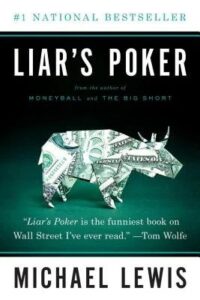
Liar’s Poker by Michael Lewis
Considered the high finance memoir, Liar’s Poker is more like a survey course of all of the hijinks, bravado, and sliminess of eighties finance—a world that often grates against today’s progressive values. (One of the most famous terms from the book is “Big Swinging Dick,” used to refer to high performers.) Lit with shocking characters spewing unforgettable lines, and engrossing from cover to cover, it also serves as a primer on the history of finance—and bond trading, specifically. As the debut work of Michael Lewis, it also laid the tracks for what would become possibly the greatest financial writing career of all time.
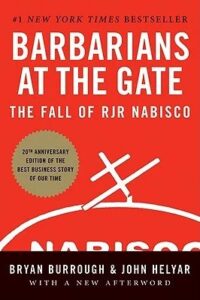
Barbarians at the Gate: The Fall of RJR Nabisco by Bryan Burrough and John Helyar
Barbarians at the Gate is so character-focused that, while in the depths of it, I often forgot I wasn’t reading a novel. Burrough and Helyar paint high finance as a collision of desires, with bigwigs battling to bend the fate of a corporation to each their will. (Needless to say, shareholders and workers alike are left powerless.) It also shines a light on how contrived finance can be, with new instruments (i.e. leveraged buyouts) built just to enrich their inventors. I love this book so much I name drop it in my novel, The Vegan, along with Den of Thieves by James B. Stewart.
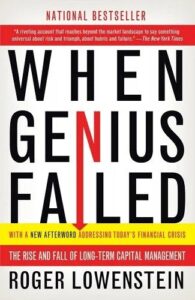
When Genius Failed: The Rise and Fall of Long-Term Capital Management by Roger Lowenstein
Some say that culture echoes itself every twenty years, especially in the realm of fashion (haircuts, pant styles, etc.) This may be true of today’s fascination with AI trading, which recalls the rise of financial modeling in the late nineties. When Genius Failed tells the story of Long-Term Capital Management, a hedge fund that trusted their formulas so blindly, they all but guaranteed their own downfall. With a story arc that would make most novelists green with envy, the book also introduces two topics that would prove crucial in the financial crises of 2008 and 2020: ultra-leveraged investing, and the underestimation of correlation.
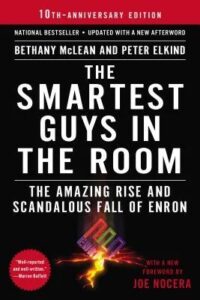
The Smartest Guys in the Room: The Amazing Rise and Scandalous Fall of Enron by Bethany McLean and Peter Elkind
It’s deeply ironic that Enron is now seen as an anomalously greedy endeavor, as the schemes it deployed—manipulating mark-to-market accounting, cooking the books ahead of earnings, and colluding with ostensibly objective consultants—has since become ubiquitous. Through McLean and Elkind’s telling, we see just how much a company’s stock price matters: when it goes up, shareholders applaud; when it falls, heads must roll. The book also brings to life the phrase “the devil’s in the details.” At its heart is the tale of how some of the most (seemingly) mundane accounting imaginable can lead to the downfall of a $70 billion corporation.
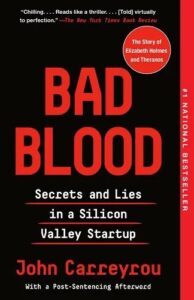
Bad Blood: Secrets and Lies in a Silicon Valley Startup by John Carreyrou
Yes, Elizabeth Holmes is a grifter nonpareil. Yes, along with Ramesh “Sunny” Balwani, she made a fool of investors and the government, showing a company valued at $9 billion to be more or less a house of cards. But the most amazing part of this story isn’t Holmes’ duplicity—it’s the complicity of everyone around her. Bad Blood is a vivid document, capturing the tech bubble in all of its frothy, fraudulent glory, with valuations based on shaky projections and all parties involved incentivized to intensify the hype. Carreyrou deftly shows how money can mold morals in the modern age, and how easily a company can wield “virtue” for its own profitable means. (Lest we forget, Theranos’ mission statement included the goal to “empower people everywhere to live their best possible lives.”)
__________________________________

The Vegan by Andrew Lipstein is available from Farrar, Straus and Giroux, an imprint of Macmillan, Inc.
Andrew Lipstein
Andrew Lipstein is the author of Last Resort (FSG, 2022), a novel “you’ll think about . . . for weeks after you read the last pages” (Los Angeles Times). He lives in Brooklyn, New York, with his wife and son.



















